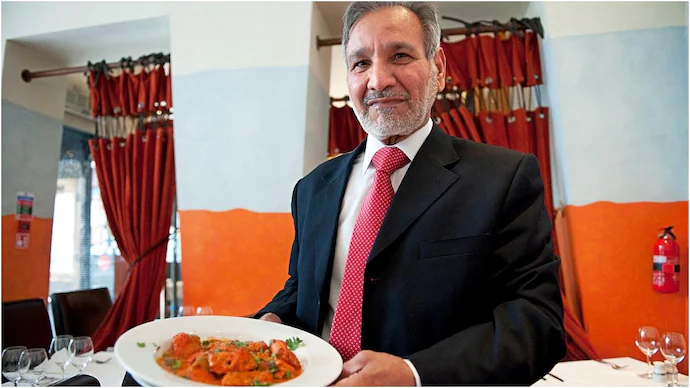
Ali Ahmed Aslam, inventor of Chicken Tikka Masala, passes away at 77

Ali Ahmed Aslam, a chef from Glasgow (Scotland), who claimed to have invented the popular dish Chicken Tikka Masala, has passed away, a family member told news agencies on Wednesday. Ali, who had his roots in Pakistan, was 77. According to his nephew Andleeb Ahmed, he died on Monday morning.
Twenty-one years ago, UK’s then foreign secretary Robin Cook had declared Chicken Tikka Masala, popularly known by its initials CTM, as “a true British national dish.” A decade later, a survey had found that it was the second most popular dish in Britain, close on the heels of Chinese stir fries. While it is hard to prove with certainty that this is the origin of the dish, chicken tikka masala — ubiquitous in India — is widely regarded as a curry that has been adapted to suit Western tastes.
Aslam’s death was announced on Facebook by his restaurant Shish Mahal in a post that read: “RIP Mr Ali… Hey Shish Snobs … Mr Ali passed away this morning … We are all absolutely devastated and heartbroken.” The dapper restaurateur is shown in the kitchen sporting a T-shirt that read: ‘Eat Sleep Shish Repeat’.
Also read: Six ways to trim salt in your food without losing out on taste
The restaurant was closed for 48 hours as a mark of respect. Tributes from all over started pouring in for the chef. Hundreds of customers paid tribute to Mr Ali on social media, many recalling visits to his restaurant and describing him as a true gentleman. Aslam was known to friends and customers as ‘Mr Ali’, and is survived by five children. His funeral, attended by family and friends, was held at the Glasgow Central Mosque on Tuesday (December 22).
A way to make chicken tikka less dry
Aslam is said to have come up with the dish in the 1970s at his restaurant Shish Mahal in Glasgow’s West End, which he opened as a young boy in 1964, when a customer asked if there was a way of making his chicken tikka less dry. He added yoghurt, creamy tomato sauce and some spices to the chicken and the chicken tikka masala was born. Later, it rose to the top spot among menu items in British eateries.
In an interview with the AFP news agency, he would later describe the moment he came up with one of Britain’s favourite dishes. “Chicken tikka masala was invented in this restaurant, we used to make chicken tikka, and one day a customer said, ‘I’d take some sauce with that, this is a bit dry’,” he recalled.
“We thought we’d better cook the chicken with some sauce. So from here we cooked chicken tikka with a sauce that contains yogurt, cream, and spices. “It’s a dish prepared according to our customer’s taste, usually they don’t take hot curry, that’s why we cook it with yogurt and cream.”
The politics over CTM
According to The Guardian, Mohammad Sarwar, the then Labour MP for Glasgow Central who returned to Pakistan and joined Imran Khan’s Tehreek-i-Insaf party, had called for the city to be officially recognised as the home of the chicken tikka masala in 2009.
He campaigned for Glasgow to be given EU Protected Designation of Origin status for the curry and tabled a motion to that effect in the House of Commons. But the bid was unsuccessful, The Guardian reports, “with a number of other establishments around the UK also claiming to have invented the popular dish”.
Also read: Karnataka brings plurality to plates in times of malnutrition food policing
Robin Cook had referred to the dish as an essential component of the country’s culture, which is one of the arguments used by those who favour giving it protected status. “Chicken tikka masala is now a true British national dish, not only because it is the most popular, but because it is a perfect illustration of the way Britain absorbs and adapts external influences,” Cook said in a 2001 speech on British identity. CTM may not have got the EU stamp, but Robin Cook’s tribute to it still holds good.
(With inputs from Agencies)


